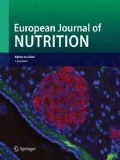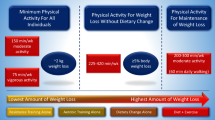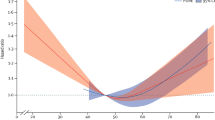Abstract
Purpose
To prospectively evaluate the association of the Mediterranean-DASH diet intervention for neurodegenerative delay (MIND) diet and the Mediterranean diet (and their components), and depression risk.
Methods
We followed-up (median 10.4 years) 15,980 adults initially free of depression at baseline or in the first 2 years of follow-up. Food consumption was measured at baseline through a validated food-frequency questionnaire, and was used to compute adherence to the MIND and the Mediterranean diets. Relationships between these two diets and incident depression were assessed through Cox regression models.
Results
We identified 666 cases of incident depression. Comparing the highest versus the lowest quartiles of adherence, we found no association of the MIND diet and incident depression. This relation was statistically significant for the Mediterranean diet {hazard ratio (HR) 0.75, [95% confidence interval (95% CI) 0.61, 0.94]; p < 0.01}, although with departure from linearity. A reduced depression risk was associated with higher consumption of both fruits and nuts [HR 0.82 (95% CI 0.69, 0.96); p = 0.02], moderate nuts consumption [HR 0.77 (95% CI 0.64, 0.93); p = 0.01], and avoidance of fast/fried food [HR 0.63 (95% CI 0.41, 0.96); p = 0.03].
Conclusions
The Mediterranean diet was associated with reduced depression risk, but we found no evidence of such an association for the MIND diet.


Similar content being viewed by others
References
Whiteford HA, Degenhardt L, Rehm J et al (2013) Global burden of disease attributable to mental and substance use disorders: findings from the global burden of disease study 2010. Lancet 382(9904):1575–1586. https://doi.org/10.1016/S0140-6736(13)61611-6
The Lancet (2016) Global burden of disease study 2015 assesses the state of the world’s health. http://www.thelancet.com/gbd. Accessed Apr 2017
Mykletun A, Bjerkeset O, Overland S et al (2009) Levels of anxiety and depression as predictors of mortality: the HUNT study. Br J Psychiatry 195(2):118–125. https://doi.org/10.1192/bjp.bp.108.054866
Casacalenda N, Perry JC, Looper K (2002) Remission in major depressive disorder: a comparison of pharmacotherapy, psychotherapy, and control conditions. Am J Psychiatry 159(8):1354–1360. https://doi.org/10.1176/appi.ajp.159.8.1354
van Zoonen K, Buntrock C, Ebert DD et al (2014) Preventing the onset of major depressive disorder: a meta-analytic review of psychological interventions. Int J Epidemiol 43(2):318–329. https://doi.org/10.1093/ije/dyt175
Opie RS, Itsiopoulos C, Parletta N et al (2017) Dietary recommendations for the prevention of depression. Nutr Neurosci 20(3):161–171. https://doi.org/10.1179/1476830515Y.0000000043
Sanchez-Villegas A, Delgado-Rodriguez M, Alonso A et al (2009) Association of the Mediterranean dietary pattern with the incidence of depression: the Seguimiento Universidad de Navarra/University of Navarra follow-up (SUN) cohort. Arch Gen Psychiatry 66(10):1090–1098. https://doi.org/10.1001/archgenpsychiatry.2009.129
Sanchez-Villegas A, Henriquez-Sanchez P, Ruiz-Canela M et al (2015) A longitudinal analysis of diet quality scores and the risk of incident depression in the SUN Project. BMC Med 13:197. https://doi.org/10.1186/s12916-015-0428-y
Orgeta V, Qazi A, Spector A et al (2015) Psychological treatments for depression and anxiety in dementia and mild cognitive impairment: systematic review and meta-analysis. Br J Psychiatry 207(4):293–298. https://doi.org/10.1192/bjp.bp.114.148130
Richard E, Reitz C, Honig LH et al (2013) Late-life depression, mild cognitive impairment, and dementia. JAMA Neurol 70(3):374–382. https://doi.org/10.1001/jamaneurol.2013.603
Martinez-Lapiscina EH, Clavero P, Toledo E et al (2013) Mediterranean diet improves cognition: the PREDIMED-NAVARRA randomised trial. J Neurol Neurosurg Psychiatry 84(12):1318–1325. https://doi.org/10.1136/jnnp-2012-304792
Tangney CC, Li H, Wang Y et al (2014) Relation of DASH- and Mediterranean-like dietary patterns to cognitive decline in older persons. Neurology 83(16):1410–1416. https://doi.org/10.1212/WNL.0000000000000884
Morris MC, Evans DA, Tangney CC et al (2006) Associations of vegetable and fruit consumption with age-related cognitive change. Neurology 67(8):1370–1376. https://doi.org/10.1212/01.wnl.0000240224.38978.d8
Devore EE, Kang JH, Breteler MM et al (2012) Dietary intakes of berries and flavonoids in relation to cognitive decline. Ann Neurol 72(1):135–143. https://doi.org/10.1002/ana.23594
Morris MC, Tangney CC, Wang Y et al (2015) MIND diet slows cognitive decline with aging. Alzheimers Dement 11(9):1015–1022. https://doi.org/10.1016/j.jalz.2015.04.011
Morris MC, Tangney CC, Wang Y et al (2015) MIND diet associated with reduced incidence of Alzheimer’s disease. Alzheimers Dement 11(9):1007–1014. https://doi.org/10.1016/j.jalz.2014.11.009
Segui-Gomez M, de la Fuente C, Vazquez Z et al (2006) Cohort profile: the ‘Seguimiento Universidad de Navarra’ (SUN) study. Int J Epidemiol 35(6):1417–1422. https://doi.org/10.1093/ije/dyl223
Martin-Moreno JM, Boyle P, Gorgojo L et al (1993) Development and validation of a food frequency questionnaire in Spain. Int J Epidemiol 22(3):512–519
de la Fuente-Arrillaga C, Ruiz ZV, Bes-Rastrollo M et al (2010) Reproducibility of an FFQ validated in Spain. Public Health Nutr 13(9):1364–1372. https://doi.org/10.1017/S1368980009993065
Fernandez-Ballart JD, Pinol JL, Zazpe I et al (2010) Relative validity of a semi-quantitative food-frequency questionnaire in an elderly Mediterranean population of Spain. Br J Nutr 103(12):1808–1816. https://doi.org/10.1017/S0007114509993837
Trichopoulou A, Costacou T, Bamia C et al (2003) Adherence to a Mediterranean diet and survival in a Greek population. N Engl J Med 348(26):2599–2608. https://doi.org/10.1056/NEJMoa025039
Schroder H, Fito M, Estruch R et al (2011) A short screener is valid for assessing Mediterranean diet adherence among older Spanish men and women. J Nutr 141(6):1140–1145. https://doi.org/10.3945/jn.110.135566
Sanchez-Villegas A, Schlatter J, Ortuno F et al (2008) Validity of a self-reported diagnosis of depression among participants in a cohort study using the structured clinical interview for DSM-IV (SCID-I). BMC Psychiatry 8(1):43. https://doi.org/10.1186/1471-244x-8-43
Desquilbet L, Mariotti F (2010) Dose–response analyses using restricted cubic spline functions in public health research. Stat Med 29(9):1037–1057. https://doi.org/10.1002/sim.3841
Morris MC, Tangney CC, Wang Y et al (2015) MIND diet associated with reduced incidence of Alzheimer’s disease. Alzheimer’s Dement 11(9):1007–1014. https://doi.org/10.1016/j.jalz.2014.11.009
Smagula SF, Lotrich FE, Aizenstein HJ et al (2017) Immunological biomarkers associated with brain structure and executive function in late-life depression: exploratory pilot study. Int J Geriatr Psychiatry 32(6):692–699. https://doi.org/10.1002/gps.4512
Pasquali MA, Harlow BL, Soares CN et al (2017) A longitudinal study of neurotrophic, oxidative, and inflammatory markers in first-onset depression in midlife women. Eur Arch Psychiatry Clin Neurosci. https://doi.org/10.1007/s00406-017-0812-z
Torres SJ, Nowson CA (2012) A moderate-sodium DASH-type diet improves mood in postmenopausal women. Nutrition 28(9):896–900. https://doi.org/10.1016/j.nut.2011.11.029
Valipour G, Esmaillzadeh A, Azadbakht L et al (2017) Adherence to the DASH diet in relation to psychological profile of Iranian adults. Eur J Nutr 56(1):309–320. https://doi.org/10.1007/s00394-015-1081-0
Perez-Cornago A, Sanchez-Villegas A, Bes-Rastrollo M et al. (2016) Relationship between adherence to dietary approaches to stop hypertension (DASH) diet indices and incidence of depression during up to 8 years of follow-up. Public Health Nutr:1–10. https://doi.org/10.1017/S1368980016001531
Sanchez-Villegas A, Martinez-Gonzalez MA (2013) Diet, a new target to prevent depression? BMC Med 11:3. https://doi.org/10.1186/1741-7015-11-3
Mila-Villarroel R, Bach-Faig A, Puig J et al (2011) Comparison and evaluation of the reliability of indexes of adherence to the Mediterranean diet. Public Health Nutr 14(12A):2338–2345. https://doi.org/10.1017/S1368980011002606
Bach A, Serra-Majem L, Carrasco JL et al (2006) The use of indexes evaluating the adherence to the Mediterranean diet in epidemiological studies: a review. Public Health Nutr 9(1A):132–146
Trichopoulou A, Bamia C, Trichopoulos D (2009) Anatomy of health effects of Mediterranean diet: Greek EPIC prospective cohort study. BMJ 338:b2337. https://doi.org/10.1136/bmj.b2337
Lai JS, Hiles S, Bisquera A et al (2014) A systematic review and meta-analysis of dietary patterns and depression in community-dwelling adults. Am J Clin Nutr 99(1):181–197. https://doi.org/10.3945/ajcn.113.069880
Willett WC (2013) Nutritional epidemiology, 3rd edn. Oxford University Press, New York
Acknowledgements
We would like to thank the participants of the SUN cohort for their continuous involvement in the project and all members of the SUN study for their support and collaboration.
Author information
Authors and Affiliations
Corresponding author
Ethics declarations
Financial support
The Seguimiento Universidad de Navarra (SUN) Project has received funding from the Spanish Government-Instituto de Salud Carlos III, and the European Regional Development Fund (FEDER: MAMG) [CIBER-OBN (MAMG), PI10/02293 (MBR), PI13/00615 (MBR), PI14/01668 (MBR), and G03/140 (MAMG)], the Navarra Regional Government [45/2011(MBR), 122/2014 (MBR)], and the University of Navarra.
Ethical standards
During recruitment, potential participants were provided details about the study and what participation entails. They were also aware that they could withdraw from the study anytime without any adverse consequence. Voluntary completion of the baseline questionnaire was considered consent to participate. Details regarding the cohort have been previously reported. The Research Ethics Committee of the University of Navarra approved the study.
Electronic supplementary material
Below is the link to the electronic supplementary material.
Rights and permissions
About this article
Cite this article
Fresán, U., Bes-Rastrollo, M., Segovia-Siapco, G. et al. Does the MIND diet decrease depression risk? A comparison with Mediterranean diet in the SUN cohort. Eur J Nutr 58, 1271–1282 (2019). https://doi.org/10.1007/s00394-018-1653-x
Received:
Accepted:
Published:
Issue Date:
DOI: https://doi.org/10.1007/s00394-018-1653-x




